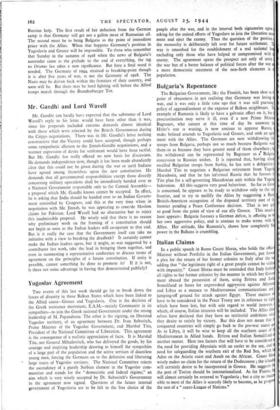Yugoslav Agreement
Two events of this last week should go far to break down the forces of disunity in those Balkan States which have been linked to the Allied cause—Greece and Yugoslavia. One is the decision of the Greek resistance movement, E.A.M.—mainly Communist in its sympathies—to join the Greek national Government under the strong leadership of M. Papandreou. The other is the signing, on liberated Yugoslav territory, of an agreement between Dr. Ivan Subasitch, Prime Minister of the Yugoslav Government, and Marshal Tito, President of the National Committee of Liberation. This agreement is the consequence of a realistic appreciation of facts. It is Marshal Tito, not General Mihailovitch, who has delivered the goods, by his courage and inspiring leadership drawing to himself the sympathies of a large part of the population and the active services of dauntless young men, forcing the Germans on to the defensive and liberating large tracts of Yugoslav territory. The National Committee rejects the ascendancy of a purely Serbian element in the Yugoslav com- munities and stands for the "democratic and federal regime," an aim which is very wisely accepted by Dr. Subasitch's Government in the agreement now signed. Questions of the future internal government of Yugoslavia are to be left to the free choice of the
people after the war, and in the interval both signatories agree asking for the united efforts of Yugoslays to join the liberation as ment and eject the enemy. Thus the question of the position the monarchy is deliberately left over for future settlement. way is smoothed for the establishment of a real national fr excluding only those who have helped or compromised with enemy. The agreement opens the prospect not only of unity the war but of a better balance of political forces after the war a more democratic treatment of the non-Serb elements in population.


























 Previous page
Previous page